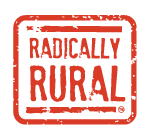Day 3: July 10, 2024
Today was my favorite day of the whole trip so far in such unexpected ways. I’ll be continuing Matt’s story another day so that I can share some of the goodness of today.
Rural Grassroots Organizations: Hood River Latino Network Immigration Help Center (LNHC) and the Rural Organizing Project (ROP)
When looking into Hood River prior to the trip, I read about a help center opening to support the Latino community, which according to census data, comprises over 30% of the Hood River population. There are several reasons they stood out to me.
Firstly, reading about the Hood River Latino Network and knowing that this center just opened a few months ago, I knew that they were meeting the needs of a huge portion of the rural base, and I wanted to know more about the needs that were driving their work, what was working for them, and more about the base of rural folks they are supporting.
Secondly, I had read about their fiscal sponsor, the Rural Organizing Project (ROP), and was fascinated by the model they are using to support so many rural grassroots organizations across the state. According to their website, they support a “multi-issue, rural-centered, grassroots base in Oregon.” Their priority is “…a shared standard of human dignity: the belief in the equal worth of all communities…”
The method they use to further these goals is to “strengthen the skills, resources, and vision of primary leadership in local autonomous human dignity groups with a goal of keeping such groups a vibrant source for a just democracy.” So it was beautiful to me that ROP wasn’t trying to duplicate work, reinvent the wheel, or assume leadership and control. Rather, they were simply funding, supporting, and uplifting leaders and efforts in their own communities.
That method has clearly been successful given that they have been in operation since 1992.
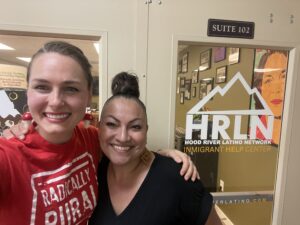 I didn’t reach out to the help center far enough ahead of time to get an appointment, so my southern heart was a little nervous about interrupting their work. The moment we walked in, Martha Verduzco-Ortega (staff) and Arturo Leyva (dedicated volunteer) greeted us warmly. Before they even found out why we were there, they said, “Come have a seat at the table!” They asked us about who we were and what we did, and then Martha proceeded to share about many important projects they do for their community. During our conversation, at least five folks stopped by to speak with Martha and get assistance. She deftly moved between our conversation and enthusiastically supporting them, without an ounce of frustration and only warmth. Arturo told us, “Everyone loves Martha.”
I didn’t reach out to the help center far enough ahead of time to get an appointment, so my southern heart was a little nervous about interrupting their work. The moment we walked in, Martha Verduzco-Ortega (staff) and Arturo Leyva (dedicated volunteer) greeted us warmly. Before they even found out why we were there, they said, “Come have a seat at the table!” They asked us about who we were and what we did, and then Martha proceeded to share about many important projects they do for their community. During our conversation, at least five folks stopped by to speak with Martha and get assistance. She deftly moved between our conversation and enthusiastically supporting them, without an ounce of frustration and only warmth. Arturo told us, “Everyone loves Martha.”
To set the stage, Martha told us that though census records show that Hood River is a little over 30% Latino, but that doesn’t account for everyone. Based on many other factors, she believes that it’s closer to between 50-60%. Many folks in their community came here to work in the orchards, so one of their efforts is to advocate for better housing conditions on the farm (she shared an example of a housing situation that accommodated 60 people with only one washer and dryer). Among many other efforts, they help folks get their driver’s licenses, fill out many kinds of paperwork, and have a Latino festival every August. One event they run has food, music, and many local non profits, service centers, and other rural grassroots organizations in attendance so that the Latino community is exposed to what is available in the region. There they also do a lot of outreach for voter registration so that all voices in Hood River can be represented in the decisions that are made.
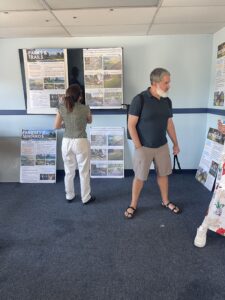
Speaking of, Martha invited us to attend a community information gathering session at the public pool. She is on the board for Parks & Rec, and they had just had an overwhelming amount of the local community turn out to vote “no” on funding a land swap to build a new pool and provide other essential recreation infrastructure and resources for the community. The pool they have now has another 2-3 years of life in it and would be a huge loss to the community. It would have added about $350 to the property taxes for the median assessed value. They were gathering information to figure out “what’s next.” It was really cool to be invited to see local democracy in action.
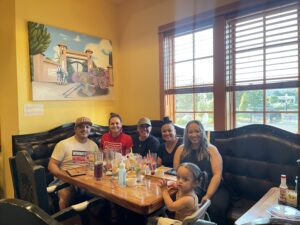 She then invited us to dinner with her family, who work for farm housing rights and food access. They all had kids with them too, which made me feel right at home. We loved chatting with them and learning about what was like for them here. Martha invited us to her house the next morning to make a special drink involving fresh goats’ milk from their herd. We were anxious to take her up on the invitation until I remembered that I had our National Advisory Group meeting at the same time! I just truly feel like Martha and her family embody what it means to be rural. The innovation, responsiveness to the needs of the community, warmth, welcoming, and collaborative spirit were the best we found in Hood River.
She then invited us to dinner with her family, who work for farm housing rights and food access. They all had kids with them too, which made me feel right at home. We loved chatting with them and learning about what was like for them here. Martha invited us to her house the next morning to make a special drink involving fresh goats’ milk from their herd. We were anxious to take her up on the invitation until I remembered that I had our National Advisory Group meeting at the same time! I just truly feel like Martha and her family embody what it means to be rural. The innovation, responsiveness to the needs of the community, warmth, welcoming, and collaborative spirit were the best we found in Hood River.
In between meeting with the LNHC and going to the pool info gathering session, we were enthusiastically greeted by Michelle Martin and Alicia Flory from The Ford Family Foundation (TFFF). They drove several hours to meet us for lunch! Both of them are registered for our September summit and it was an absolute treat to be with them in person and learn more about them personally and the work that they are both so passionate about. We’ll be writing more about the work the TFFF is doing and the rural grassroots organizations they are supporting soon.
Wild Spaces
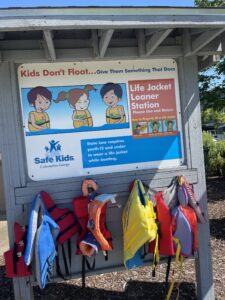 We had so many unexpected serendipitous moments today that we didn’t have space in the schedule to venture out of the main area of town. However, we did head down to the water and let me tell you, it was a different world down there! It was both beautiful and chock full of outdoor enthusiasts windsurfing, kite surfing, and more.
We had so many unexpected serendipitous moments today that we didn’t have space in the schedule to venture out of the main area of town. However, we did head down to the water and let me tell you, it was a different world down there! It was both beautiful and chock full of outdoor enthusiasts windsurfing, kite surfing, and more.
Tidbits:
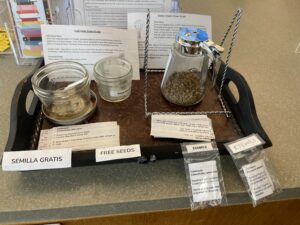
- Down at the public water access point, there were free life jackets to borrow to make sure that everyone stayed safe.
- The library had free seeds at the checkout desk with instructions on how to plant them!
- During the interview with Arturo and Martha, Arturo showed me an app that can record conversations and make a written transcript of them. It even distinguishes between speakers. Afterwards, he sent me the transcript of the interview. That app was specific for Android, but after a quick peek in the Apple App Store, there seem to be several free options. Wanted to put that out there for you in case it helps!
What’s Next?
Though this is the last day of our trip, future blogs will include…
- More about the fantastic and lively conversation with Michelle Martin and Alicia Flory from The Ford Family Foundation, as well as many of their innovative models that are doing so much good for the rural communities in Oregon.
- The Library of Things and other replicable models at the Hood River Library
- Our conversations with many local folks really confirmed what we felt when coming to Hood River, which was a huge dichotomy between the “downtown” wealth and tourist haven, and the rest of Hood River. This is a common theme for many rural communities who have become outdoor recreation destinations, so I’ll certainly be circling back to this theme.
